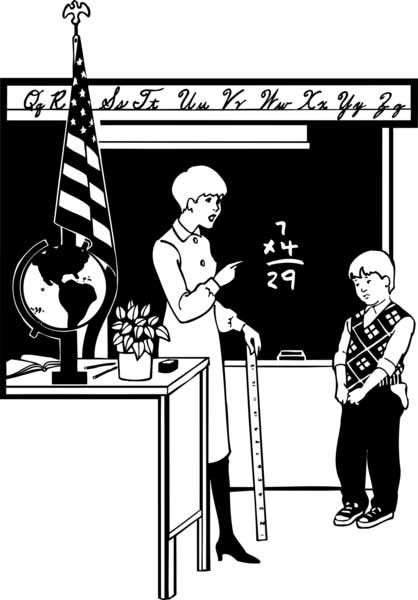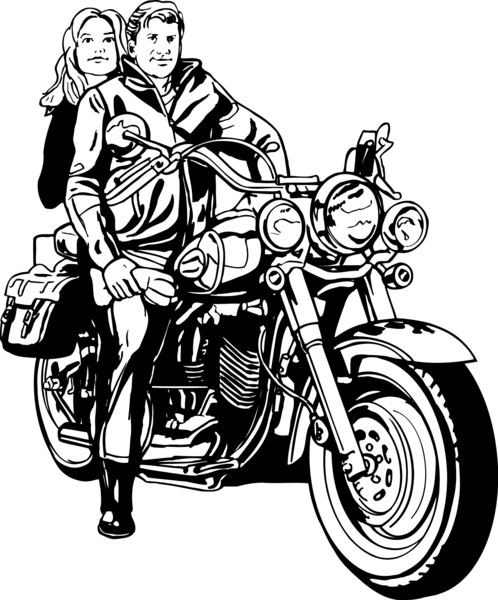Grammar at School:
"Can I" and "May I"...
 |
Click to get this lesson as an Adobe Acrobat file for printing or use in a class. |
Click Here for Step-by-Step Rules, Stories and Exercises to Practice All English Tenses
When I was in school, I politely asked the teacher "Can I go to the bathroom?" And do you think the teacher said "yes, Toby, but hurry back"? No, she didn't. She just looked at me, crossed her arms, and smiled. "I don't know, Toby," she said, "can you?"
She waited until I asked with may. "May I go to the bathroom?" Then she told me to hurry back. It's easy to see why I don't like teachers, isn't it?

We all like to talk about what we can do: mostly, we're proud of what we can do. We don't often talk about what we may do, because it's normal for even native speakers of English to confuse the two words.
I will tell you right now: if you confuse "can" and "may," most people won't hear the difference. This is not a grammar point where you risk sounding like an idiot. But, if you're learning English for work and you want your clients to think you're intelligent and responsible, let me add this piece of advice: using "may" when you're supposed to will make you sound smarter.
And we all like sounding smarter. It's why we're learning English in the first place, right?

When do we use "can" in the first place?
The first step away from mis-using the word can is to understand what it really means. Can refers to something that you are able to do, or something that is in your power.
Look at the first case, the things you are able to do:
-
Do you know how to drive a car? You can drive a car. (Even if you don't have a license!)
-
Do you know how to speak English? You can speak English. (Even if it's not perfect.)
-
Is German your native language? You can speak German.
-
Do you run ten kilometers every day? You can run ten kilometers.

Anything you do, you can do. You must be able, or capable, of doing it before you can do it. But there are many things that you can do, that you don't do.
Are you strong enough to jump from a bridge? Then you can jump off a bridge, but I don't think it's a good idea. (It's too cold, now, for one thing!) Do you have a fast car? Then you can drive 200 km/h in the city, but it wouldn't be safe. My sister can climb walls, but I can't. I also can't speak Chinese, or French.
Did you know that taxes in the Unites States aren't set by the President? In other words, he can't raise or lower taxes. He can only ask the Congress to change the taxes. It's not in his power. We also use the word can to describe things that are in your power.
At my school, for example, the teacher's don't have the power to fail a student. No matter what a student does, I can't fail him. But the homework is in my power. I can give a student extra homework, if he's not doing well. Or, I can ask the student a lot of questions.
The key is this: when something is possible for you, whether you want to or should do it, you can do it. Think about all the things you can do, but don't. You can travel to the north pole, if you want. You can learn to speak Chinese. You can do almost anything you really want to.
In two minutes, write down as many things you can do on a piece of paper. It doesn't matter if you do them or not. Just think of things that you can do. And don't forget to think of the things that are in your power. Now write down things that you can't do.
And what are the things you "may" do?
The word may has two meanings. In it's first meaning, it has no connection to what is possible, or what is impossible, unlike the word "can." The word may only means that something isn't forbidden.
Think about parents and children. When most parents see that their two-year-old child has found a sharp knife, will they get the camera and take a picture? Of course not! They'll take the knife from the child. It's possible for the child to play with the knife, but the child may not play with the knife. Another way to say this is, the child is not allowed to play with the knife.
Another example: when I lived in the United States, I got a driver's license for a motorcycle. In the U.S., I may ride a motorcycle. For two years, the only vehicle I had was a motorcycle, and I rode it all year long. I am certain that I can ride a motorcycle. But my American driver's license isn't good in Germany, so even though I can ride a motorcycle, Germany says I may not.

The rule to remember is this: Can deals with possibility, may deals with permission.
Look at the list that you made of things that you can do. How many of them may you do? Are there any that you may not do?
Would you be surprised if I told you that we don't normally say "may not." In 'normal' American English, we just say 'I'm not allowed' instead of "may not." This is especially true of the first person, or of times when we use the word "I." Consider these examples:
-
I'm not allowed to ride a motorcycle in Germany.
-
I may ride in the U.S., when I'm there.
-
My son isn't allowed to date girls (or boys) until he is thirty!
-
He may study grammar any time he wants to.
-
He is allowed to speak any language he wants, except British English!
Did you see how, in the last example, I used "is allowed" where I could have used "may?" We do that pretty often, so don't be surprised if you hear or read it.
On a piece of paper, write down the things that you were allowed to do as a child. And what are the things that you won't allow your child to do? May your child date when he is ten? May he join a gang?
What may happen in the future?
I said a moment ago that may has two meanings. It does. The second meaning refers to future possibilities.
We're used to talking about the future with the word "will." When we use the word "will," we're saying that—while we can't make any guarantees—we expect something to happen in the future. "I will die, someday." "The doctor will see you now." "What will you do in Paris?" "I probably won't learn French." The word "will" means "in the future, probably."

So what do we say when we don't know if something will happen or not? What do we say when we want to say "in the future, maybe?" Here, we use the word may, again:
-
In the future, I may learn French, but I have been saying I would learn French for the last year, so, I may not, too.
-
If you come to Dresden, you may see me: I work right in the middle of the city, but I can't promise you'll see me.
-
The new President may change the way the world looks at America.
-
It may rain tomorrow, so bring an umbrella!
The thing to remember is this: the word may is much less certain than the word "will," it only indicates a possibility. That's right, you read that correctly: in the first meaning, may doesn't refer to possibility, it refers to permission. And in the second meaning, it refers only to possibility. The key is to remember if you're talking about the future—then, it's only possibility—or if you're talking about the present—then it's permission.
Think you've got it? Think about next year. What are some things that may happen next year? Are there any things you're certain will happen next year? What are some things you expect that may not happen next year? (For example: I may not get more money than this year, but I hope I will.)
For extra practice, try to list things that you may do, but can't. And then list things that you can do, but may not.
Get Updates, Special Offers, and English Resources
Download your FREE GIFT (the first two chapters of
English Short Stories Book and Workbook)
as soon as you join!

By submitting your email, you consent to receiving updates and newsletters from us and to the sharing of your personal data with third parties for the purposes of sending you communications. We will not spam you. You can unsubscribe at any time. For more information, please see our privacy policy.





